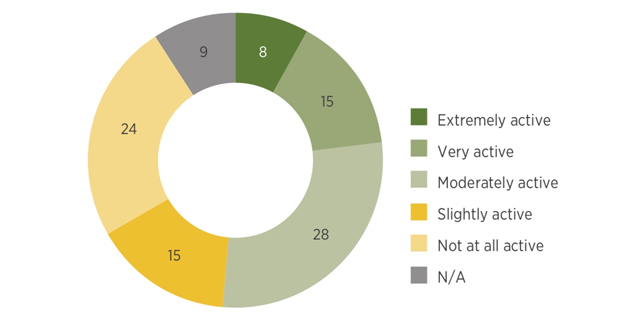A quarter of employers (24%) make no effort to attract and recruit diverse candidates for top-level jobs, according to a new report.
The latest Resourcing and Talent Planning Survey 2020 (carried out by CIPD and Omni) suggests employers could be making even more diversity progress, particularly for senior level roles. The research reveals that only 23% firms actually go beyond basic legislative requirements to recruit diverse hires. For example, the study found that just 33% firms ensure they have a diverse interview panel or hiring team. Only 37% monitor their recruitment to obtain data on protected characteristics. Furthermore, just 27% firms remove certain biographical details from the initial selection process to prevent bias. Additionally, only 23% check that recruitment tests used are valid, reliable and objective.
The report, which polled 660 employers, shows that just two in five firms (41%) have been recruiting a more diverse workforce in the last year. In response to the results, both CIPD and Omni are calling on employers to be more strategic about attracting and recruiting diverse candidates to fill senior roles and broaden their outreach. Employers should also consider targeting their recruitment strategies to include under-represented groups for these roles, the study suggests.

DISAPPOINTING PROGRESS
“It’s particularly disappointing to find that a quarter of organisations are not doing anything to improve boardroom diversity,” commented Claire McCartney, Senior Resourcing and Inclusion Adviser at the CIPD, the professional body for HR and people development. “Not only is this where the problem is most acute, as the Parker Review and other research shows, but achieving change here would have maximum impact. We need to have a broad range of diverse people in decision-making roles and be role models for future talent.”
The findings of this report suggest that improvements in workforce diversity have happened by accident rather than design. “We could be making quicker and considerable progress with a more strategic approach,” McCartneypointed out. “Employers can’t expect to make meaningful change through a leave-it-and-see policy. Improving diversity needs to be actively worked on and we’d encourage all employers to add much more rigour, consistency and challenge into their recruitment and selection processes. With many companies understandably focusing on dealing with the economic fallout from the Covid pandemic, it’s important that improving diversity is a priority throughout and beyond the pandemic.”

INCREASING DIVERSE HIRES
Louise Shaw, Director Resourcing Transformation at Omni RMS, agrees: “It’s disappointing that little progress has been made since 2017. The #BlackLivesMatter protests brought the racial inequalities within our societies and workplaces into sharp focus, and we believe organisations must be held accountable for ensuring greater racial and, of course, broader diversity at the very top. “Recruiting diverse talent is only the start and organisations need to be reporting externally on their true effectiveness by measuring inclusive engagement, retention, and career development. This is what will give organisations full visibility of what is and isn’t working so they can make informed changes and realise the business benefits.”
The report also explores the use of technology during the recruitment and selection process – from chatbots to video CVs – to improve diverse hires. Around 28% of employers said it has helped to reduce unconscious bias to a large or moderate extent – and they are also more likely to report that technology has increased the diversity of their hires. However, it’s important to test tech recruitment solutions to ensure they aren’t disadvantaging candidates and are accessible to all, the research pointed out.
KEY RECOMMENDATIONS
The report also recommends that organisations take the following steps to improve diversity:
- Critically evaluate your organisation’s brand to see how attractive it is to diverse candidates. What changes can you make to your brand/ culture to help attract, select, develop and retain more diverse employees?
- Develop programmes like career returners and mid-career change to help broaden talent pools and people’s skills.
- Evaluate recruitment activities to assess which are most effective at broadening talent pools.
- Ask questions about what is critical to the role; people from different industries or backgrounds may have transferable skills and knowledge, and can bring fresh insight.
Click here to download the report.





































